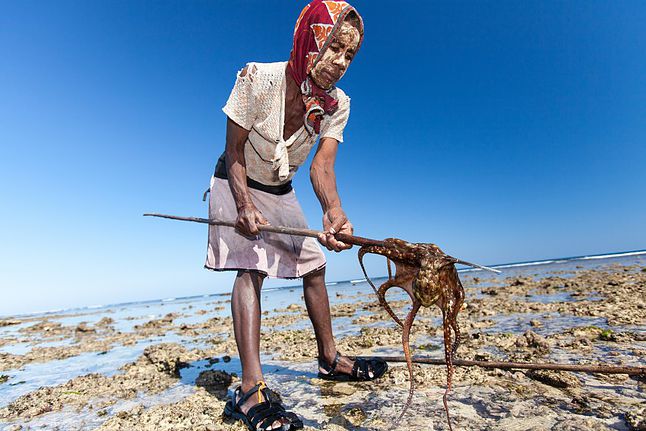Fishing Communities Reap Dividends from Marine Protection
July 04, 2015
A landmark study from the Indian Ocean island of Madagascar highlights compelling economic benefits of locally led fisheries management
Marine protection pays. This is the striking conclusion of a recent study evaluating fisheries management efforts by coastal communities in Madagascar.
Marine scientists from Blue Ventures Conservation studied octopus landings in the remote southwest of the island over an eight year period, during which villagers had periodically set aside designated areas of their fishing grounds as temporary ‘closures’ to octopus gleaning.

The study sought to quantify the impacts of this shortterm closure model by examining landings from 36 periodic octopus fishery closure sites, and comparing these landings to control sites where no fishing grounds were closed.
Describing the study’s findings, lead author Dr. Tom Oliver, now the Ocean and Climate Change Team Lead at NOAA’s Coral Reef Ecosystem Division, said: “This fisheries management regime brings substantial returns for these communities, with individual octopus yields increasing by almost 90% and village level fishing income more than doubling in the month following each closure.”
Octopus is one of the region’s most important stocks, fished by women and men, and sold on to lucrative export markets with seafood companies transporting catches from some of the Indian Ocean’s remotest villages all the way to restaurants and supermarket shelves in southern Europe.
Each closure typically covers one fifth of a village’s fishing grounds and lasts for around three months, during which octopus fishing is banned by a traditional local law established by community committees. When the closed sites are reopened to gleaning, villagers share in a surge of catches, thanks to the incredibly rapid growth rates of reef octopus.
The study, published in the openaccess journal PLOS ONE, shows that these closures generate significant and recurring ‘payoffs’ for coastal communities in short timeframes, which is particularly important in a country where the average per capita income is under US$2 per day.
On average, communities discovered that 1 dollar’s worth of octopus left in the ocean had grown to $1.81 by the end of a closure.
The study also highlights that communities saw no significant decline in income during closures, but notes that villages with high rates of illegal poaching during closures experienced reduced economic performance, underscoring the importance of local level enforcement to accrue benefits from closures.
On the ground, the practical benefits of this fisheries management approach are being seen by fishing businesses and communities alike. “Thanks to the octopus closures, export companies have bigger octopuses” said Vassant Ramdenee, Director of seafood business Murex International in the coastal city of Toliara.
The approach now receives strong support from fisheries authorities. “We encourage temporary fisheries closures set up by fishers, because communities see many benefits” said Gilbert François, General Director of Madagascar’s Ministry of Fisheries and Marine Resources. “The closures increase the number, as well as the weight, of octopus caught for 30 days after the closures, helping improve the production of octopus.”
Following the rapid uptake of this fisheries management regime by villages along the western coast of Madagascar and beyond, many of these communities have moved on to establish more ambitious marine conservation initiatives, including the creation of Locally Managed Marine Areas (LMMAs) vast areas of coast and ocean incorporating permanent reserves and customary laws banning destructive fishing practices in order to help protect marine biodiversity and rebuild fish stocks.
This broader management outcome adds to a growing body of evidence demonstrating that shortterm interventions yielding tangible benefits can enhance community engagement, providing a powerful catalyst for sustainable fisheries management and locally led conservation.
Fisheries scientist and study coauthor Daniel Raberinery, of Blue Ventures and the University of Toliara, said: “By demonstrating that effective fisheries management can reap dividends, this model can play a powerful role building local support for marine conservation.”
________________________________________________________________________
Acknowledgements
This study was carried out in partnership with fishing communities in southwest Madagascar, the University of Toliara’s Institut Halieutique et des Sciences Marines, Madagascar’s Ministère des Ressources Halieutiques et de la Pêche, and seafood companies Copefrito and Murex. This research was generously supported by partners including the John D. and Catherine T. MacArthur Foundation, the Helmsley Charitable Trust, the Network for Social Change, and the African Development Bank.
________________________________________________________________________
Additional material
➔ The full paper can be accessed on the journal PLOS ONE here .
➔ This photographic story describes the reopening of a temporary fisheries closure in southern
Madagascar.
➔ This film documents the fisheries closure model in Madagascar and neighbouring Mauritius.
➔ To contact the authors, please write to research{at}blueventures.org.
________________________________________________________________________
About Blue Ventures
Blue Ventures works with coastal communities to develop transformative approaches for catalysing and sustaining locally led marine conservation. We work in places where the ocean is vital to local cultures and economies, and are committed to protecting marine biodiversity in ways that benefit coastal people. Our conservation models are designed to demonstrate that effective management improves food security and makes economic sense.
Over the past decade, our work has guided national fisheries policy and been replicated by communities, NGOs, businesses, donors and government agencies along thousands of kilometres of coastline.
This short film provides an overview of Blue Ventures’ work, with more information about conservation programmes here. An overview of our strategy to rebuild tropical fisheries can be found here.